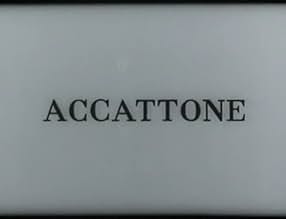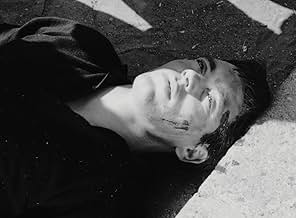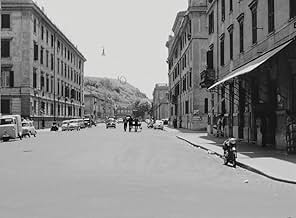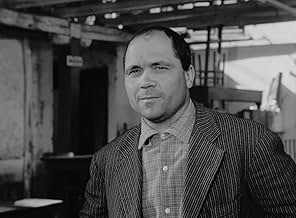A pimp with no other means to provide for himself finds his life spiraling out of control when his prostitute is sent to prison.A pimp with no other means to provide for himself finds his life spiraling out of control when his prostitute is sent to prison.A pimp with no other means to provide for himself finds his life spiraling out of control when his prostitute is sent to prison.
- Director
- Writers
- Stars
- Nominated for 1 BAFTA Award
- 3 wins & 4 nominations total
- Director
- Writers
- All cast & crew
- Production, box office & more at IMDbPro
7.610.9K
1
2
3
4
5
6
7
8
9
10
Featured reviews
Accattone: a story of the Roman lumpenproletariat
Just to start with, Accattone was not filmed in Naples but in Rome. Someone might have brought to that understanding by some Neapolitans gangsters that appear at some point in the movie As for the "ruins" that scatter the landscape, they are mostly buildings that will soon replace the barracks such as the one in which Accattone lives, or the Acquedotto Felice, an ancient Roman aqueduct that runs close to Prenestina and Casilina, two Roman suburbs, that you can see in Mamma Roma as well. Franco Citti, the character of Accattone, perfectly embodies the roman lumpenproletariat of the time: idle, fatalistic and desperate. Pasolini met Franco's brother Sergio, a plasterer, hanging around Cinecittà in 1951. He introduced him to his brother Franco that became Pasolini's dialectical adviser for Accattone, Mamma Roma and his book "Ragazzi di vita"; his "living vocabulary" as he called him. Indeed, Pasolini interests for dialects and slangs (Roman is not really a dialect anymore but a slang) was not disappointed. The dialogues between the characters are full of fantasy: rude and in some way reminiscent of their peasant past. A must see if you're interested in Neorealism and in the "ways of the underworld lumpenproletariat". Someone connected this movie with Bunuel's "Los Olvidados". I definitely agree.
a documentary-dramatization of a pimp looking for redemption
Accattone announces a director, Pier Paolo Pasolini, who is a haunting/haunted poet from his surroundings and realist, someone who wants to put his eye on the world without flinching on the details of how 'ordinary' (of the street) people speak and interact, how raw and uninhibited they can be, these being the guys on the streets who are vulgar and coarse at best and at worst are abusers of women. But at the same time what one comes away with is poetry in documentary form - it's another level of neo-realism, a little more like an urban story than a post-war treatise that still throbs with the importance of those in poverty. Anytime I hear the song Matthaus Passion I'll immediately contemplate those harsh images of Vittorio Accattone, being cast aside by his family for being a pimp, or that poor girl being beaten at night by that gang of men, which is something that elevates such hard scenes into art.
Vittorio Accattone is the main character- charming and attractive, and also a perpetual scoundrel who also is a total outcast. He has a wife and kid(s), but is estranged from them by choice - her choice most likely - and he finds himself in big trouble once his main prostitute, Maddalena, is sent to prison for a bad informing job. It's after this we see Accatone on his potential path to redemption when he meets a supremely sweet and average girl from out of town, Stella, who he may eye as a new girl on the street... or perhaps not, as his attachment to her grows more and stronger, in spite of what and who are around him every day and night in the dirty province.
He's someone we want to root for in being a better person, or, perhaps even, better at what he does. He's a tragic anti-hero in a New-Wave sort of sense, cool looking and aspiring to be modern and cool (and maybe he is, up to a point), but also poor and uneducated, so much so that being on the fringe and being called "PIMP!" is what he's been reduced to by default. The performance from Franco Citti is one thing that keeps the viewer locked in: he's so good here because he looks plucked right off the street by Pasolini, as would turn to be his method with choosing most of his 'actors' on camera. There's a reality to his interactions with his friends (so called) or his business associates. Some of their dialog and tones of speech aren't refined or look trained. At one point when Citti's Vittorio breaks down in tears- a sudden turn from a previous scene showing more attitude- is authentic, even as another actor could have possibly played it "better".
It is what Pasolini wants, and he gets it, much in the same way he also gets a view of this side of Rome in a way that hasn't been seen before up until this time. His DP Tonino Delli Colli shoots simply often, and sometimes not so much - there's complexity, say, to a tracking shot in front of Accatone talking to a girl who is on a bicycle, or when we see the horrorshow of the men taking Maddalena at night in the middle of nowhere, the only lights starkly coming from the car. The effect is nothing short of a slow-burn. While a few of the actors do fall a bit too flat, and some scenes come close to lagging around (the editing might be the most significant flaw here), the raw emotion and fire in the subject matter keeps things fascinating. You want to see what happens with this young guy, and it's his tragedy that gets us absorbed, even as the Bach music abstracts the sorrow, and agonizing poetry of the streets, and it's this that makes it a classic.
Only downside I must mention - if you live in the US, or happen to watch it on a DVD or online from Walter Bearer films, the print is just not very good. It's the sort where the white subtitles drop in and out of view depending on who's standing where in a frame. It's not totally detrimental, but some scenes become hard to follow due to the poor quality of the subtitles with the print. This, if for no other reason, demands the film receive the Criteron treatment.
Vittorio Accattone is the main character- charming and attractive, and also a perpetual scoundrel who also is a total outcast. He has a wife and kid(s), but is estranged from them by choice - her choice most likely - and he finds himself in big trouble once his main prostitute, Maddalena, is sent to prison for a bad informing job. It's after this we see Accatone on his potential path to redemption when he meets a supremely sweet and average girl from out of town, Stella, who he may eye as a new girl on the street... or perhaps not, as his attachment to her grows more and stronger, in spite of what and who are around him every day and night in the dirty province.
He's someone we want to root for in being a better person, or, perhaps even, better at what he does. He's a tragic anti-hero in a New-Wave sort of sense, cool looking and aspiring to be modern and cool (and maybe he is, up to a point), but also poor and uneducated, so much so that being on the fringe and being called "PIMP!" is what he's been reduced to by default. The performance from Franco Citti is one thing that keeps the viewer locked in: he's so good here because he looks plucked right off the street by Pasolini, as would turn to be his method with choosing most of his 'actors' on camera. There's a reality to his interactions with his friends (so called) or his business associates. Some of their dialog and tones of speech aren't refined or look trained. At one point when Citti's Vittorio breaks down in tears- a sudden turn from a previous scene showing more attitude- is authentic, even as another actor could have possibly played it "better".
It is what Pasolini wants, and he gets it, much in the same way he also gets a view of this side of Rome in a way that hasn't been seen before up until this time. His DP Tonino Delli Colli shoots simply often, and sometimes not so much - there's complexity, say, to a tracking shot in front of Accatone talking to a girl who is on a bicycle, or when we see the horrorshow of the men taking Maddalena at night in the middle of nowhere, the only lights starkly coming from the car. The effect is nothing short of a slow-burn. While a few of the actors do fall a bit too flat, and some scenes come close to lagging around (the editing might be the most significant flaw here), the raw emotion and fire in the subject matter keeps things fascinating. You want to see what happens with this young guy, and it's his tragedy that gets us absorbed, even as the Bach music abstracts the sorrow, and agonizing poetry of the streets, and it's this that makes it a classic.
Only downside I must mention - if you live in the US, or happen to watch it on a DVD or online from Walter Bearer films, the print is just not very good. It's the sort where the white subtitles drop in and out of view depending on who's standing where in a frame. It's not totally detrimental, but some scenes become hard to follow due to the poor quality of the subtitles with the print. This, if for no other reason, demands the film receive the Criteron treatment.
Stunning Debut of a Great Director
In the poor periphery of Rome of the 60's, the despicable caftan Vittorio "Accattone" Cataldi (Franco Citti) is maintained by the hooker Maddalena (Silvana Corsini), spending the time with his useless idle friends. When the prostitute is arrested for perjury, the pimp "Accattone" has nobody to support him, but he seduces the naive worker Stella (Franca Pasut) and she becomes a whore. However, Accattone has a crush on Stella and decides to find a way to support her, with tragic consequences.
"Accattone" is the stunning debut of the great director Pier Paolo Pasolini. He returns to the theme of the misery of Italy in the postwar, explored in many Italian neo-realist movies such as Fellini's "Le Notti di Cabiria" (1957) and Visconti's "Rocco e i Suoi Fratelli" (1960), and magnificently shows the lifestyle of great part of the population in Italy, its lower class, with lack of perspective, starvation, prostitution and unemployment. Considering that this movie is also the debut or the beginning of the career of most actors and actresses, it is amazing how Pasolini was able to make such gem. My vote is nine.
Title (Brazil): "Accattoni Desajuste Social" ("Accattoni Social Maladjustment")
"Accattone" is the stunning debut of the great director Pier Paolo Pasolini. He returns to the theme of the misery of Italy in the postwar, explored in many Italian neo-realist movies such as Fellini's "Le Notti di Cabiria" (1957) and Visconti's "Rocco e i Suoi Fratelli" (1960), and magnificently shows the lifestyle of great part of the population in Italy, its lower class, with lack of perspective, starvation, prostitution and unemployment. Considering that this movie is also the debut or the beginning of the career of most actors and actresses, it is amazing how Pasolini was able to make such gem. My vote is nine.
Title (Brazil): "Accattoni Desajuste Social" ("Accattoni Social Maladjustment")
Free radical
Accattone is a Roman pimp who lives off his girlfriend Maddalena's earnings. Pasolini's cheeky aim is to put forward this young man as a modern saint. To this end he lathers Bach's St Matthew's Passion (inspired by the Apostle's experience of the crucifixion of Christ) over scenes of Accattone's life. Indeed in one of Accattone's first scenes he's shown devouring a slice of tomato, displayed horizontally as if a cardinal's galero, whilst an sculpture of perhaps a guardian angel can be seen over his shoulder in the distance (an anti-clerical pro-Christ stance seems to be a consistent theme for Pasolini). Later, a prophecy regarding Accattone's descent is eerily similar to Christ's pronunciation of Peter's forthcoming triple renunciation.
The film reminded me of a DH Lawrence poem (elliptically titled Democracy):
"I love the sun in any man / when I see it between his brows / clear, and fearless, even if tiny // But when I see these grey successful men / so hideous and corpse-like, utterly sunless, / like gross successful slaves mechanically waddling / then I am more than radical, I want to work a guillotine
...
I feel that when people have gone utterly sunless / they shouldn't exist."
Whatever Accattone is, he's not sunless; when he tries out the world of work (legitimate work involving labour), he becomes Vittorio, his Christian name, and the light goes out. The film reminds me very much of Fassbinder's Gods of the Plague in that sense, young men with brio but no skills or education who, given the choice, between drudgery or crime, choose crime. Both films polemicise against urban post-industrial capitalist societies, which have become increasingly removed from the milieu in which humanity evolved and is "designed" to cope with. When Accattone compares the chore of lifting rolls of iron with the horrors of Buchenwald the film goes a little over the top.
Of course someone viewing Accattone and his friends through less of a haze of desire than the director might think that they were just a bunch of jerks. Undeniably though, Pasolini is a great poet, and there's evidence of things to come here, the film whilst looking largely Bertoluccian (he was the assistant director), has the occasional master shot, for example the rolling hills and valley in the dream sequence, par with Leonardo in quality of composition and symbolism; the countryside here representing an idealised rural precursor to Accattone's slum existence.
I also applaud Pasolini for taking his arguments beyond class, Accattone's group of spongers contains educated men as well as dunces, and they are equally disdainful of the ruling class as they are of proletarians.
The film reminded me of a DH Lawrence poem (elliptically titled Democracy):
"I love the sun in any man / when I see it between his brows / clear, and fearless, even if tiny // But when I see these grey successful men / so hideous and corpse-like, utterly sunless, / like gross successful slaves mechanically waddling / then I am more than radical, I want to work a guillotine
...
I feel that when people have gone utterly sunless / they shouldn't exist."
Whatever Accattone is, he's not sunless; when he tries out the world of work (legitimate work involving labour), he becomes Vittorio, his Christian name, and the light goes out. The film reminds me very much of Fassbinder's Gods of the Plague in that sense, young men with brio but no skills or education who, given the choice, between drudgery or crime, choose crime. Both films polemicise against urban post-industrial capitalist societies, which have become increasingly removed from the milieu in which humanity evolved and is "designed" to cope with. When Accattone compares the chore of lifting rolls of iron with the horrors of Buchenwald the film goes a little over the top.
Of course someone viewing Accattone and his friends through less of a haze of desire than the director might think that they were just a bunch of jerks. Undeniably though, Pasolini is a great poet, and there's evidence of things to come here, the film whilst looking largely Bertoluccian (he was the assistant director), has the occasional master shot, for example the rolling hills and valley in the dream sequence, par with Leonardo in quality of composition and symbolism; the countryside here representing an idealised rural precursor to Accattone's slum existence.
I also applaud Pasolini for taking his arguments beyond class, Accattone's group of spongers contains educated men as well as dunces, and they are equally disdainful of the ruling class as they are of proletarians.
Incredibly bleak tale, told without sentiment or moral preaching
The term 'accattone' is an old Italian phrase intended to brand a character with an aura of absolute repulsiveness. Thieves and low-lives would usually coin the term when referring to a character that is so despicable, so without moral or social decency, that even the criminals would look down upon them. In Pier Paolo Pasolini's incredibly assured debut, 'Accattone' is Vittorio (Franco Citti), a low-life pimp who when he is not sitting around squeezing money out of people with wagers and tricks, is abusing his lone prostitute who cannot work after breaking her leg in a motorcycle accident. It's a tale of a despicable scumbag, set during a dark period in Rome, where men viewed working as slave labour, and enjoyed themselves by beating prostitutes to within an inch of their life.
It's an incredibly bleak tale, told without sentiment and moral preaching. Pasolini's doesn't seem to want to dictate a larger social message, or make Accattone a sympathetic character who is the victim of political or social oppression, but to simply tell a tale, a real tale, of a group of low-lives who are the way they are because they want to be. After all, the true soul of neo-realism is to portray life the way actual people experience it, not to romanticise or sentimentalise it with the kind of scripts Hollywood are responsible for. Of course, many neo-realist directors would almost betray the genres roots the kind of way only auteurs can manage, and Pasolini would go on to make more surrealistic and interpretive movies, but this is true neo-realism without any kind of magical reward for the audience, or a moment of redemptive enlightenment for its protagonist. It's a story of grit, one that is thrilling and fascinating in equal measures, and with the stamp of a great director.
The film I felt it more akin to is Luis Bunuel's Los Olvidados (1950), a film of equal disregard for cinematic wonder, and one that is also punctured by an impressive dream sequence. Whilst Bunuel's sequence came around the middle section, and was a burst of absolute surrealistic beauty amongst social depravity, Accattone's comes during its climax; a strange, moody set-piece in which Accattone witnesses his own funeral, amongst other things. At first I felt like it was almost betraying what came before, but then I realised it was Pasolini's way to try and get into its characters head, and the outcome is as confusing and as futile as Accattone himself. Though I haven't seen much of Pasolini's work, this is the best I've seen, beating even the distressing brilliance of his final film Salo (1975). Though he would move away from neo-realism, Pasolini achieves more with his debut than some of the greats of the genre would manage to achieve.
www.the-wrath-of-blog.blogspot.com
It's an incredibly bleak tale, told without sentiment and moral preaching. Pasolini's doesn't seem to want to dictate a larger social message, or make Accattone a sympathetic character who is the victim of political or social oppression, but to simply tell a tale, a real tale, of a group of low-lives who are the way they are because they want to be. After all, the true soul of neo-realism is to portray life the way actual people experience it, not to romanticise or sentimentalise it with the kind of scripts Hollywood are responsible for. Of course, many neo-realist directors would almost betray the genres roots the kind of way only auteurs can manage, and Pasolini would go on to make more surrealistic and interpretive movies, but this is true neo-realism without any kind of magical reward for the audience, or a moment of redemptive enlightenment for its protagonist. It's a story of grit, one that is thrilling and fascinating in equal measures, and with the stamp of a great director.
The film I felt it more akin to is Luis Bunuel's Los Olvidados (1950), a film of equal disregard for cinematic wonder, and one that is also punctured by an impressive dream sequence. Whilst Bunuel's sequence came around the middle section, and was a burst of absolute surrealistic beauty amongst social depravity, Accattone's comes during its climax; a strange, moody set-piece in which Accattone witnesses his own funeral, amongst other things. At first I felt like it was almost betraying what came before, but then I realised it was Pasolini's way to try and get into its characters head, and the outcome is as confusing and as futile as Accattone himself. Though I haven't seen much of Pasolini's work, this is the best I've seen, beating even the distressing brilliance of his final film Salo (1975). Though he would move away from neo-realism, Pasolini achieves more with his debut than some of the greats of the genre would manage to achieve.
www.the-wrath-of-blog.blogspot.com
Did you know
- TriviaThis was Bernardo Bertolucci's first work in movies. He was an assistant director.
- GoofsThe shadow of the camera is clearly visible on Accattone's shirt when he walks away towards the camera after the fight with Ascenza's Brother.
- Quotes
Vittorio "Accattone" Cataldi: Call me Accattone. There are lots of Vittorios but I'm the only Accattone.
- Alternate versionsThe VHS and DVD versions produced by Water Bearer Films are listed as running 116 minutes, suggesting that this print is four minutes shorter than the original release.
- ConnectionsEdited into Red Italy (1979)
- SoundtracksSt Matthew Passion
Composed by Johann Sebastian Bach
- How long is Accattone?Powered by Alexa
Details
- Release date
- Country of origin
- Languages
- Also known as
- The Scrounger
- Filming locations
- Ponte Testaccio, Rome, Lazio, Italy(motorbike accident)
- Production companies
- See more company credits at IMDbPro
Box office
- Gross worldwide
- $2,865
- Runtime
- 1h 57m(117 min)
- Color
- Sound mix
- Aspect ratio
- 1.37 : 1
Contribute to this page
Suggest an edit or add missing content


































